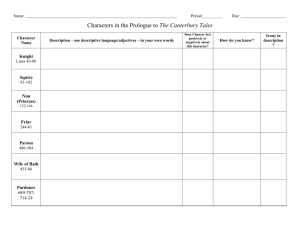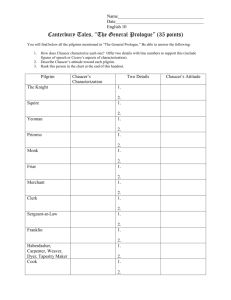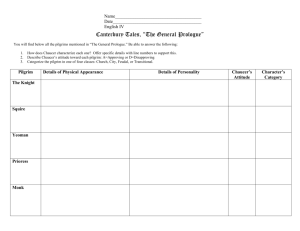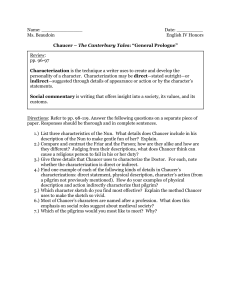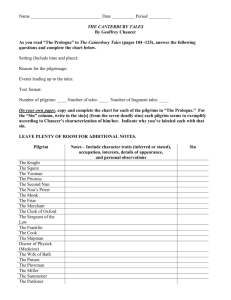The Canterbury Tales
advertisement
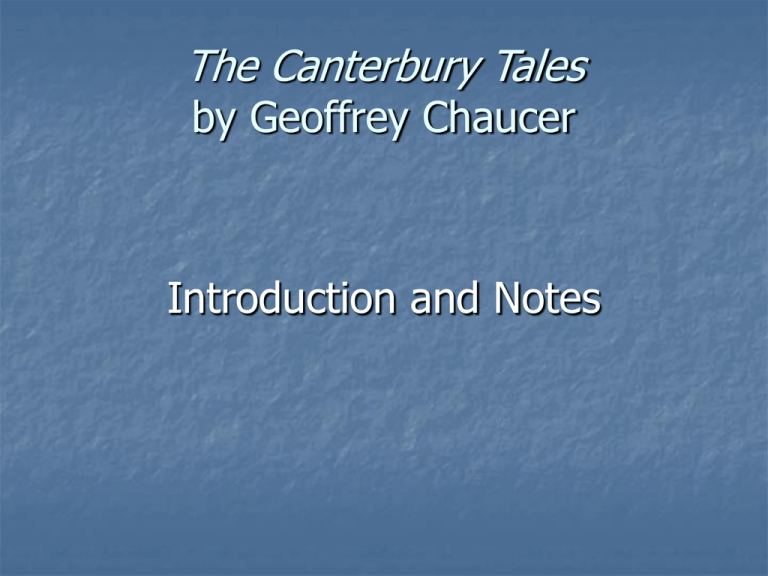
The Canterbury Tales by Geoffrey Chaucer Introduction and Notes •Theme – infinite variety of human nature •Pilgrimage – used as a device to frame individual stories told by individual characters •Date – April 11, 1387 •St. Thomas’ shrine – to ask for help & healing •Narrator – Chaucer •Number – 29 •Naïve & observant – Chaucer pretends to be naïve, but he is really observant of human nature • • • • Chaucer’s plan – to describe the pilgrims Knight – 1st because he had the highest social rank – noble, distinguished, honorable, truthful, generous, courteous – he has just returned from the Crusades – he has been spreading Christianity – true Christian Direct characterization – lines 70-74 – “He was a true, a perfect gentle-knight” Squire – 20 – agile, strong, valiant, welldressed, sang, played music, horseman, fighter, dancer, lover – he was courteous/solicitous of his father – he respected his father • • Yeoman – pg. 97 – hood/coat of green, bow & arrow, hunter, shield & sword, fighter, dagger, serious-minded, medal of St. Christopher – patron St. of travelers – well traveled – outdoorsman Nun – Prioress (ranked just below the head nun of an abbey) – simple, coy (shy but flirtatious) – clinging, helpless, dainty, jewelry, wealth – Madame Eglantyne (wild rose with long, thorny stems) – a put on - pretentious • • • Chaucer's attitude toward the nun amused tolerance – he thinks she is amusing, but at the same time, he simply tolerates her Monk – ignored rules – worldly – fine clothes – overweight – wealthy – hypocrite – eats too much – rides, hunts, sports Picture on pg. 99 – clothes, ignores doctrines of the church, spurs, hunting, heavy, eats much • • • • • Friar – represents corruption of the church – forgives sins for gifts Lines 227-254 – The more a person gave the more the Friar forgave Lines 244-254 – Indirect characterization – Chaucer describes who the Friar knew and how he spent his time Lines 253-254 – The Friar will use people for money Why didn’t Friar develop relationship with poor? Because they were poor and could not help him • • • Merchant – spoke highly of himself – others thought he actually occupied a high paying position – In reality, he was broke Oxford Cleric – (Oxford student) thin, poorly dressed, serious student, loved books over all else Lines 309-312 – Any money the cleric took from friends, he would buy books – He would pray for them in return for borrowing books • • • • • Sergeant at the Law – (Lawyer) wary, wise, discreet, respected Line 325 – commission – to give authorization Franklin – wealthy landowner – confident, cheerful, lives for pleasure, entertains a lot Middle class – Just emerging – new social class Line 368 – girdle – emphasizes his obsession with food • • • • • Haberdasher, Dyer, Carpenter, Weaver, Carpet-maker – members of the middle class – skilled workers Line 377 – avouches – affirms; asserts positively Cook – pus on his knee – prepared meals for them all – cream of chicken Skipper – rode horse poorly – used to the sea – thief – ruthless – competent Finisterre – means “end of the world” – skipper has traveled to the ends of the earth • • • Line 420 – The Maudelayne – irony? – comes from the word maudlin – means sentimental – the Skipper is not sentimental Doctor – quack – treated patients by looking at their stars instead of at their illnesses – makes charms & magic images – blood - red clothes – loves gold – love of $ is the root of evil – stars – Bible – charms – effigies 4 humors - *see footnote #56 on pg. 105 – leeches/bleeding • • • • • • • Woman (Wife) of Bath – has had 5 husbands – deaf in one ear – skilled @ cloth making – bold, saucy, outspoken, angry when others don’t give in to her – self-confident, loves traveling Lines 459-460 – selfish and arrogant Parson – practiced what he preached – gave to poor – holy, pure, kind, good Why is he poor? Gave to others How does he lead? By example How should priests behave? They should take care of parishioners & mind their duties Chaucer thinks others should share traits of integrity, kindness, & generosity • • • • • • Plowman – brother of the Parson – honest worker, good & true, good citizen Line 542 – direct characterization – honest, good, & true Why does Chaucer place the description of the Miller after the Plowman? Accentuates the virtues of the Plowman vs. the buffoonishness & criminality of the Miller Miller – 224 lbs. – stout, big, big, brawny, broad, slovenliness, cunning Miller’s hair color – red like a sow or fox – slovenliness, cunning Line 575 – direct characterization – mighty mouth like a furnace • • Manciple – buyer of provisions – shrewd – trickster – made shrewd decisions – masters were lawyers Reeve – old, choleric (easily angered), thin, bad temper – estate manager – close-cut hair – in charge of livestock – nice house – has saved/hoarded $$ carpenter by trade – rides gray stallion named Scot – rode at the end of the group • • • • • • Summoner – fire-red face, carbuncles (pusfilled boils resulting from a bacterial infection under the skin), has pimples, unintelligent, black, scabby brows Line 644 – “hot and lecherous as a sparrow” lewd, sexually corrupt Line 646 – Indirect characterization Immoral behavior - drunkenly behavior – would allow immoral behavior to continue if paid off – knew the secrets of young men Sneaky or respectable? Truly religious or an illusion? • • • • • Pardoner – somewhat like the Summoner – maybe even worse – sang like a woman – yellow hair Hair like rat-tails – implies moral corruption – like a rat Holy relic on his hat – bag full of pardons – voice like a goat – no facial hair – Line 711 – gelding/mare – meaning? How does . . . treat poor country people? Tricks them and makes the priests and congregation feel foolish • • • • • • Lines 748-749 – Chaucer apologizes b/c he is going to report matters frankly and not spare any details Host – jovial, enjoys entertaining, compliments all of the pilgrims, blesses them, generous, curious fellow Proposes idea – for their enjoyment, each should tell 2 tales going and 2 tales returning from Canterbury – winner receives a feast – this will draw business for him Pilgrims agree Drawing for cut – draw lots or pull straws Pilgrims agree to allow Host to judge their tales
